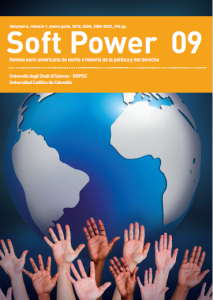Abstract
In the debate on the “crisis” of the Western liberal democracies, we can recognize a theoretical counterposition between different visions of democracy. On one side, someone denounces the “post-democratic” drift by revealing the residue between the ambitious democratic ideals and their concrete realization. On the other side, someone else answers the scope of the transformation by resorting to a much less demanding normative model of democracy, which can be referred more or less directly to the democratic elitism of Joseph A. Schumpeter. The article states that the discussion cannot have a solution, because it implies a contrast between opposing normative models. All that remains is to reintroduce the perspective of the subjects into the very definition of democracy, elaborating a cultural theory of democracy, capable of recording the fact that conflicts are more or less constantly modifying the meanings of democracy itself. Precisely for this reason, a cultural theory of democracy –which puts the same definition and redefinition of democracy at the centre of a constant conflict between different interpretations– cannot ignore the voice of the excluded.

References
Bachrach, P. & Baratz, M. S. (1962). The Two Face of Power. American Political Science Review, 56(4), pp. 941-952. doi: 10.2307/1952796.
Bachrach, P. & Baratz, M. S. (1963). Decisions and Nondecisions: An Analytical Framework, American Political Science Review, 57(3), pp. 632-642. doi: 10.2307/1952568.
Bachrach, P. (1967). The Theory of Democratic Elitism: A Critique. Boston: Little Brown and Company.
Bachrach, P. & Baratz, M. S. (1975). Power and Its Two Faces Revisited: a Reply to Geoffrey Debnam. American Political Science Review, 69(3), pp. 900-904. doi: 10.2307/1958398.
Bachrach, P. & Baratz, M. S. (1970). Power and Poverty. Theory and Practice. New York-London: Oxford University Press.
Bazzicalupo, L. (2014). Introduzione. La doppia crisi della democrazia. En L. Bazzicalupo (Ed.), Crisi della democrazia (pp. 17-30). Milano: Mimesis.
Bourdieu, P. (1979). La distinction. Critique sociale du Jugement. Paris: Minuit.
Burnham, P. (1999). The politics of economic management in the 1990s. New Political Economy, (1), pp. 37-49.
Cingari, S. & Simoncini, A. (Eds.) (2016). Lessico postdemocratico. Perugia: Stranieri University Press.
Crouch, C. (2004a). Post-Democracy. Cambridge: Polity Press.
Crouch, C. (2004b). Riflessioni sulla postdemocrazia. La società degli individui, 7(20), pp. 5-16.
Dahl, R. (1957). The Concept of Power. Behavioral Science, 2(3), pp. 201-215.
Dahl, R. (1958). A Critique of the Ruling Elite Model. American Political Science Review, 52(2), pp. 463-469.
Dahl, R. (1961). Who Governs? Democracy and Power in an American City. New Haven: Yale University Press.
Danies, W. (2014). The Limits of Neoliberalism. Authority, Sovereignty and the Logic of Competition. Sage: London.
Dardot, P. & Laval, C. (2009). La nouvelle raison du monde. Essais sur la société néoliberale. Paris: La Découverte.
Galli, C. (2017). Democrazia senza popolo. Cronache dal parlamento sulla crisi della politica italiana. Milano: Feltrinelli.
Geiselberger, H. (Ed.) (2017). La grande regressione. Milano: Feltrinelli.
Giannone, D. (2010a). La democrazia neoliberista. Concetto, misure, trasformazioni. Milano: Franco Angeli.
Giannone, D. (2010b). Political and Ideological aspects in the measurement of democracy: The Freedom House case. Democratization, (1), pp. 68-97.
Giannone, D. (2016). Neoliberalization by Evaluation: Explaining the Making of Neoliberal Evaluative State. Partecipazione e conflitto, (2), pp. 495-516.
Lo Schiavo, L. (2016). Teoria democratica e “suggestioni” foucaultiane. Postdemocrazia, governance, neoliberismo. The Lab’s Quarterly – Il Trimestrale del Laboratorio, (3), pp. 41-105.
Lukes, S. (1974). Power. A Radical View. London: Macmillan.
Mair, P. (2013). Ruling the Void. The Hollowing of Western Democracy. London: Verso.
Mastropaolo, A. (2001). Democrazia, neodemocrazia, postdemocrazia: tre paradigmi a confronto. Diritto pubblico comparato ed europeo, (4), pp. 1612-1635.
Mastropaolo, A. (2011). Democrazia è una causa persa? Paradossi di un’invenzione imperfetta. Torino: Bollati Boringhieri.
Mouffe, C. (2005). On the Political. London: Routledge.
Mounk, Y. (2018). The People vs Democracy. Cambridge: Harvard University Press.
Palano, D. (2011). Lo scandalo dell’uguaglianza. Alcuni appunti sull’itinerario di Jacques Rancière. Filosofia politica, (3), pp. 505-517.
Palano, D. (2012). La soglia biopolitica. Materiali su una discussione contemporanea. Roma: Aracne.
Palano, D. (2015a). La democrazia senza qualità. Le “promesse non mantenute” della teoria democratica. Milano: Mimesis.
Palano, D. (2015b). La democrazia dei pochi. L’eredità dell’anti-elistismo e le sfide alla teoria democratica. Quaderni di scienza politica, (2), pp. 173-234.
Portinaro, P. P. (1988). Antipolitica o fine della politica? Considerazioni sul presente disorientamento teorico. Teoria politica, 4(1), pp. 121-137.
Preterossi, G. (2015). Ciò che resta della democrazia. Roma-Bari: Laterza.
Rancière, J. (1983). Le philosophie et ses pauvres. Paris: Fayard.
Rancière, J. (1984). L’ethique de la sociologie. En Collectif “Révoltes Logiques” (Ed.). L’Empire du sociologue (pp. 13-36). Paris: Éditions La Decouverté.
Rufin, J. C. (2004). Globalia. Paris: Gallimard.
Simoncini, A. (2018). Democrazia senza futuro? Scenari dall’interregno postdemocratico. Milano: Mimesis.
Streeck, W. (2013). Gekaufte Zeit. Die vertagte Krise des demokratischen Kapitalismus. Berlin: Suhrkamp.
Supiot, A. (2015). De l’harmonie par le calcul à la gouvernance par le nombres. Rassegna Italiana di Sociologia,(3-4), pp. 454-464.










